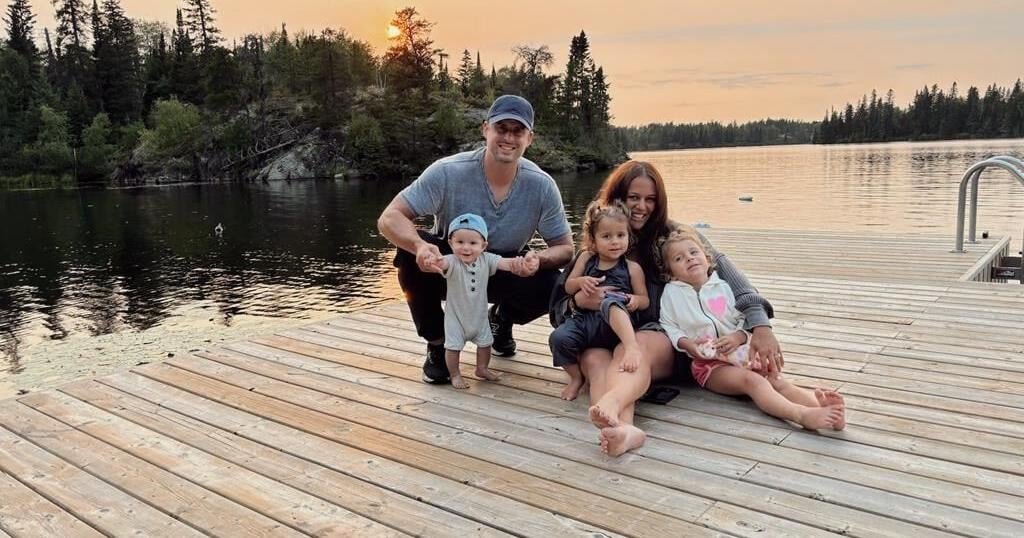WINNIPEG – Nicole Collaros switches on the Zoom chat, apologizing that husband Zach might join in late.
The Winnipeg Blue Bombers quarterback is trying to get their oldest daughter to sleep, but Sierra doesn’t like the play call.
“This is our life,” Nicole said with a laugh during the team’s recent bye week. “We don’t sleep, and it just seems to be getting worse. It’s supposed to be getting better, but it’s getting worse.
“Three (children) has been the game-changer. Two, we were good. And then three, it’s like they all end up in bed with us at some point. It’s like we play musical beds. It’s wild.”
Reluctant-sleeper Sierra is four-and-a-half years old. Daughter Capri turns three this month and son Dean is seven months.
It’s a busy household similar to many families, but with the added intensity of a six-month stretch of long days as Zach focuses on helping the Blue Bombers get to a fifth consecutive Grey Cup.
It hasn’t been a typical season for the CFL team.
The Bombers started 0-4, went to 2-6, won eight straight and then lost to the Toronto Argonauts in a game that would have clinched first place in the West Division. They only grabbed the top spot in the final regular-season game with a field goal as time expired for a 28-27 victory over the Montreal Alouettes.
Now, Winnipeg is hosting the division final against the rival Saskatchewan Roughriders on Saturday, with the winner advancing to the Grey Cup in B.C. on Nov. 17.
Despite such a roller-coaster season, Nicole said Zach remained even keel and didn’t show added stress at home.
Her No. 1 concern after a game is his health.
“I’ll say, ‘Are you hurt?’ He’ll say, ‘No’ or ‘I’m just a bit banged up,’” she said.
“(Sometimes) it’s hard for him to get out of bed the next morning. That’s very normal. It sounds so crazy. That’s not normal, but it’s normal in football life.”
She’ll gauge how he’s feeling mentally after a loss by saying it was a “rough” one, and asking if he’s all right. He’ll reply that he’ll be OK and then it’s back to their routine.
“We order McDonald’s after every home game, a late-night cheat, whatever you want to call it,” she said with a smile. “We listen to music, generally, and go to sleep.
“That’s our hanging time after the game, we rarely actually talk about the game.”
The players’ spouses and girlfriends often get together, and talked about the team’s early struggles. They asked each other how their partners were after a loss. The consensus was in a “bad mood.”
“But now coming up it’s a totally different end and we’re going to the West final,” Nicole said.
“I think I can speak for some of the wives, too. We knew they were going to turn it around. Whatever it took, they’re there for each other.”
Becoming a father has made a difference in how Zach handles the inevitable ups and downs in sports.
“We laugh because I said, ‘If this was a game in 2015, 2016, you would have lost it. You would have been really upset or angry for a few days,’” Nicole said. “I truly think having the kids and a family changed the way he looks at things.”
Nicole was a kindergarten teacher in Toronto when they met in 2015 while he played for the Hamilton Tiger-Cats. They married in February 2019, a year that also featured his trade from Saskatchewan to Toronto and then to Winnipeg in October.
Although he’s often at the stadium on practice days for up to 12 hours, he’s home for dinner and family time before they tag team the bedtime ritual. Next is a bit of couple time, then a few hours in his office watching more film.
Sometimes she’ll drop by the stadium with the kids to grab daddy time between practice and meetings.
Zach tries to watch the girls’ soccer and basketball games, as well as their dance and gymnastic classes. On the team’s off days — he still goes to the stadium for a workout — they have family outings.
He gets time for a phone call the next day after seeing the girls play soccer.
“The beginning of the season, (Sierra) was afraid to go out there on the field when it was actually live action,” he said.
“Little by little, she’s gotten better and better. She ran off today and said to her mom, ‘Mommy, I did it, I didn’t cry.’”
It’s those type of family moments he doesn’t want overshadowed by work, admitting there was some “worry” during the team’s early skid.
“You try to not let doubts seep in, but that is human nature,” he said. “When things aren’t going your way, you start to question is the process correct?
“But you also have to rely on the foundation of things that got you to where you are. Not just me, but the team in general.”
Nicole is a “great sounding board” and understands what’s required for him to perform at this best.
“During the week, my wife carries the brunt of our family’s life, is really the captain, so to speak, at home,” Zach said.
“This might come off as a cliché or something, but when I walk in the door at five or six or whatever time it is, any worry or stress I had at work kind of falls off.
“I open the door and my daughters, every single day, they say, ‘Dad!’ and they run to the door. And then you get into dad mode. … You’ve got your job and you do your job, but once you get home kind of your second job starts.”
This report by The Canadian Press was first published Nov. 6, 2024.
